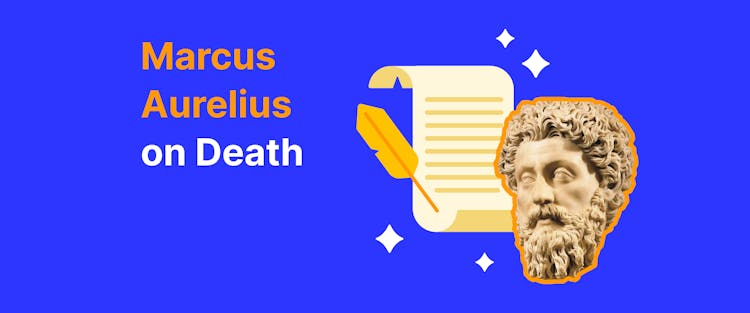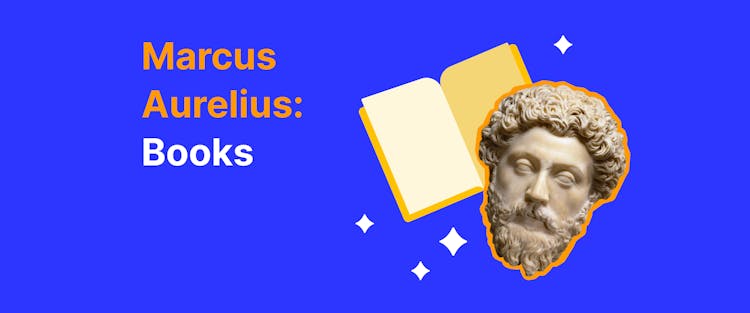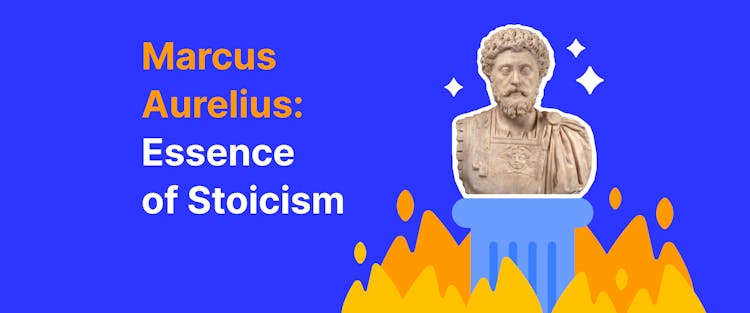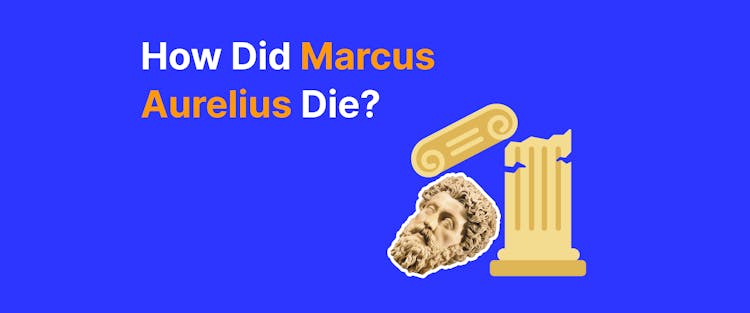Marcus Aurelius Antoninus was the last of the glorious galaxy of five good emperors of Ancient Rome—emperors Nerva, Trajan, Hadrian, and Antoninus Pius, whose rule became the "golden age" in the state's history. But that was already the end of the Roman Empire's greatness and glory. The harsh reality left an imprint of tragedy on Marcus' life. The evening came quickly, and soon, the darkness of the night enveloped the Roman camp on the banks of the Danube.
Time has nearly erased the deeds of the emperor-philosopher from history's pages, yet his collection of reflections remains intact. Flipping through Marcus Aurelius's diary today, it is hard to believe that the pearls of moral philosophy were created in camping tents during fleeting moments of rest from long, demanding days.
Marcus Aurelius's life, though not particularly lengthy, was the stuff of legend. Orphaned at an early age, he received an exemplary education, becoming a paragon of good manners and self-control. He fathered an impressive thirteen children with his one wife, to whom he remained unwaveringly loyal. He became the ruler of a vast empire, which was in danger. Marcus Aurelius's life flashed brightly like a spark, but he left his "Meditations" writings to help us understand how he thought.
Early life and rise to power
Marcus Aurelius was born in Spain in 121 in an aristocratic family of patrician origin. His paternal and maternal ancestors belonged to the senatorial class. In ancient Rome, families differed significantly from each other materially, socially, and by belonging to one or another stratum. It, in many respects, determined the formation of the worldview of the Romans, and very often, it was a decisive factor influencing his further life and military-political career. The father of the future emperor was Marcus Annius Verus, who died while serving as praetor. His mother, Domitia Lucilla, was the daughter of the Roman patrician. His grandfather, Marcus Annius Ver, was twice consul and prefect of Rome.
Having learned the Greek language as a child, Marcus actively improved his oratorical skills. Philosophy was a subject of his particular interest. Herodes Atticus and Marcus Fronto were tutors in Latin and Greek for Marcus. He was attracted to the teachings of the Cynics, their denial of social differences, and simplicity in everyday life, which Aurelius mentions in his work "Meditations."
Roman religion
Marcus Aurelius was raised with great respect for traditional Roman religion. Already at the age of seven, he was enrolled in the collegium of priests. Marcus Aurelius was cautious about fulfilling his duties. Marcus Aurelius' sincere religiosity had been essential to the Roman Empire since he became the emperor. All his actions, his policy toward religious cults and especially Christians, were determined by the fact that he sincerely believed in the Roman gods and was firmly convinced of the necessity of proper upbringing of all religious rites. A big fan of philosophy, he sympathized with philosophers who interpreted Christians negatively.

Adoptive father, Antoninus Pius
After the death of his adoptive son Aelius Caesar, Emperor Hadrian wanted to see Marcus as emperor in the future, so he offered Aurelius Antoninus (the future emperor Antoninus Pius) to adopt Marcus and Lucius Verus and, in the coming, transfer the imperial power to them. Intuition and insight allowed Hadrian to recognize the future great ruler of Rome in the boy. Antoninus Pius was a great emperor and a role model for the young Marcus, as he later wrote in his writings. From Antoninus Pius, the young man learned political art, morality, and the ability to resolve conflicts and contradictions wisely. In turn, Antoninus fully trusted his adopted son, which made him a co-ruler and allowed him to share all the responsibilities of power. Their relationship was imbued with deep mutual understanding. Antoninus married Marcus to his daughter, Faustina the Younger, and trained and instructed him extensively in the art of government.
First steps in Stoicism
At this time, Marcus Aurelius was under the influence of the outstanding Stoic philosophers Apollonius of Chalcedon and Quintus Junius Rusticus. Junius Rusticus was well-versed in Stoicism and competent in domestic policy and the military sphere. Marcus Aurelius spent his youth in the imperial palace on Palatine Hill. Famous philosophers like Fronto, Apollonius, and Junius Rusticus taught him. One day, one of them presented Marcus with "Conversations" by Epictetus. This book and the lessons of the teachers would make him a Stoic. As Aurelius admitted in his "Meditations," he borrowed a lot from them, which helped him effectively manage the empire.
Two brothers - co-emperors
The reign of Antoninus Pius was a unique period in Rome's history. No one violated the vast empire's outer borders, and peace and harmony reigned within its borders. Marcus Aurelius became the Roman emperor in 161 at the age of 40. After the death of Antoninus Pius, their adoptive father, in early 161, Marcus Aurelius Antoninus Augustus and Lucius Ceionius Commodus Verus ascended the throne as co-emperors. At first, the emperors' actions to boost the economy, fight poverty, and strengthen the army brought success and were welcomed by the empire's population. However, in the future, the difference in worldview between the Stoic views of Aurelius and the exceptional extravagance of his adoptive brother, Lucius Ver, led to unpleasant consequences. Believing that Rome was weakened, the Parthian king Vologes attacked the Roman province of Syria and its ally Armenia. The war lasted five years and ended with Rome's victory thanks to the art of Roman generals and the quality management of the empire by Marcus Aurelius, who was in Rome during the war. The results of the war were favorable to Rome, and the Parthians made no more attempts to attack Roman possessions during Aurelius' lifetime.
Philosophical beliefs and meditations
The ideal state
Stoic philosophers believed that it did not matter what business a man chose. He needed to learn to show nobility, be responsible, and follow duty and honor in everything he did. Stoics considered these qualities to be the core of human morality. Teach not by words but by example, they said. Marcus Aurelius remembered this principle all his life.
Marcus Aurelius sought to create a kingdom of philosophers, the ideal state that Plato dreamed of. The emperor's former teachers and mentors—Atticus, Fronto, Junius Rusticus, and Claudius Severus — became Roman consuls and held important positions in the state.
Even under Hadrian, the principles of Stoic philosophy were elevated, and ideas of equality between people began to penetrate the strict Roman legislation, turning it towards man. The purpose of Marcus Aurelius' laws and decrees was the welfare of the ordinary people in the empire. Civil law, the principles of the sovereign's responsibility before the law, the state's concern for citizens, the character of police, and the registration of newborns all trace their origins to Marcus Aurelius. He ordered the collection of hefty taxes from the rich and, with these funds, opened asylums for orphans and the poor and founded colleges where young Romans could study philosophy. This philosopher embodied a moderate policy.
Humane attitude towards the people
His rule reflected respect for the people, the Senate, and its members. The time of imperator Aurelius' reign was called the "Senate Renaissance" because he emphasized his obedience to the Senate, the supreme imperial power at that time. In this historical period, approaches to slavery and violence against slaves changed, and their murder was recognized as a crime thanks to the emperor. Thus, Roman emperor Marcus Aurelius tried to transfer the Stoics' teachings to the Roman state's practical realities.
Marcus Aurelius pointed to moral maxims that he sought to follow himself and advised others to follow. His humane attitude towards man and the main ideas of his philosophical thought became a remarkable legacy and heritage of the history of Ancient Rome.
“If you do the job in a principled way, with diligence, energy, and patience, if you keep yourself free of distractions, and keep the spirit inside you undamaged, as if you might have to give it back at any moment— If you can embrace this without fear or expectation—can find fulfillment in what you're doing now, as Nature intended, and in superhuman truthfulness (every word, every utterance)—then your life will be happy.” (Hays translation)

The paradoxes of power: Aurelius' Stoicism and governance challenges
Marcus Aurelius was not just a good administrator; he was a Stoic philosopher who ascended the throne and a concentration of the purest philanthropic philosophy. In the person of Marcus Aurelius, two types of people were combined: a merciful philosopher and a superstitious pagan. Paganism, as a religious cult, was very essential for the emperor. Christianity became not just one of the religions of the Roman Empire but also a religion that overthrew the paganism that Augustus loved. Marcus Aurelius issued decrees on the persecution of Christians.
Wars and internal upheavals affected imperial finances. During the wars on the Danube, extraordinary measures were necessary: items belonging to the emperor, precious dishes, precious stones, and imperial clothing were sold at auctions. The economic situation of the empire during Marcus Aurelius' reign was shaken.
Reign and achievements
In the first year of his reign, the emperor sent six Roman legions to a division with his co-ruler Lucius Verus and the best army generals to quell the rebellion in Armenia. Five years later, the Roman soldiers returned to their homeland victorious. But a plague would follow them from the East. The epidemic quickly spread throughout the empire and raged in Rome. The disease would take hundreds, thousands of human lives. 166 — a new war began. Marcomanni and Quadi filled the Roman provinces in the north. They were leading the entire barbarian world—dozens of tribes. The Roman history had never known such a situation. They armed even slaves and gladiators.
Military campaigns
Marcus Aurelius went down in history as a great general. He felt a deep aversion to war and was always far from striving for military honors and glory, but he treated the matter of protecting the state with all attention and conscientiousness. One of the most peaceful emperors in the entire history of Rome, he spent 14 of his 18-year reign in military campaigns, protecting the borders of the empire and the peace of its citizens.
He campaigned patiently, endlessly, and successfully against the Germanic tribes, Quadi and Marcomanni. They invaded the Roman province of Pannonia, prompting Marcus Aurelius to take action. This tactic was calculated based on the Roman soldier's endurance, tenacity, and the forces' economy. Marcus Aurelius did not chase brilliant victories and avoided all useless cruelty and treachery toward his enemies. The army loved and respected the emperor, and fate prepared new tests for him.
Challenges and controversies
Avidius Cassius’ rebellion
General Avidius Cassius, an intelligent, educated man who once loved Marcus Aurelius, raised a rebellion in Syria. Cassius received broad support in the eastern provinces: Egypt, Syria, and Arabia Petraea. Cassius controlled Egypt's vital grain production. Cassius wanted to win the favor of Aurelius' soldiers and provincials, so he decided to use his cunning and announce the emperor's death. After learning about Cassius' betrayal, Marcus Aurelius remained calm, not succumbing to feelings of anger and revenge for a moment. The mutiny lasted three months and six days. Avidius Cassius was killed by one of his accomplices. Marcus Aurelius gave a full amnesty to his supporters. Marcus Aurelius' reaction to the most diverse situations in life never diverged from his philosophical beliefs, and the emperor's actions in no way contradicted his highest ideas.

Aurelius’ successor
The son of Emperor Commodus is the complete opposite of his father. Later, with his rule, Commodus will write one of the darkest pages in the history of Rome. With bitterness, Marcus Aurelius realizes that after his death, the administration of the state will pass on to a man more like the son of a gladiator than the emperor of Rome.
Having a naive hope for education, Marcus Aurelius surrounds his son Commodus with teachers of philosophy and morality—without effect. The heir seeks only the society of mimes, circus riders, and gladiators, whom he surpasses in rudeness and strength. Amid betrayals, the Stoic emperor maintains his nobility. He sincerely believes that sincere kindness is invincible. Commodus was the last representative of the Antonine dynasty, which ruled the Roman Empire for almost 100 years.
Legacy and death
Marcus Aurelius' sole rule lasted until 177 when his 16-year-old son Lucius Aurelius Commodus became co-ruler. Well-educated, Marcus Aurelius gained fame as a philosopher during his lifetime, leaving behind a "Meditations" written in Greek and a moderate ruler. His death in 180 (Vienna) is considered the end of the two-hundred-year period known as the "Peace of Rome," followed by a time of instability and wars that led to the gradual decline of the Roman Empire.
Echoes through time: The enduring influence of "Meditations"
Marcus Aurelius wrote his thoughts on life in the 70s of the second century, having already had the opportunity to summarize his own life and the development of Rome's empire under his leadership. What is a philosophy? It is not intellectual knowledge, not the construction of theoretical systems, but a method of inner work and transformation of a human being, a set of philosophical exercises designed to change a life. Pierre Hadot, in his book The Inner Citadel: The Meditations of Marcus Aurelius, talks about writing a philosophical work, conducting an intellectual dialogue, reflecting on concepts, and self-reflection as an awareness of the value of the present moment. All these are different facets of philosophy as a way of life.
Explore Aurelius' "Meditations" through Headway
In the "Meditations," Marcus Aurelius transcended the historical tragedies that defined his life. Stoic philosophy guided his choices and way of life. You can discover this by reading or listening to a summary of the "Meditations" in the Headway app.
Frequently Asked Questions
When was Marcus Aurelius emperor?
At 40, Marcus Aurelius became the sixteenth emperor of the Roman Empire. He was a Roman emperor from 161 to 180. He ascended the throne in 161 and ruled with his brother Lucius Verus until 169. Marcus Aurelius became the Roman Empire's sole ruler after Lucius Verus' death.
Who ruled after Marcus Aurelius?
Commodus reigned as emperor following Marcus Aurelius from 180 to 192. He was the last representative of the Antonine dynasty, named after his father's co-ruler, Lucius Verus Commodus. He made peace with the barbarians and gave up new territorial possessions.
How was the reign of Marcus Aurelius different from that of most emperors?
Marcus Aurelius was a knowledgeable and cultured person who found the most pleasure in philosophy above all other pursuits. He faced one of the most challenging tasks of any Emperor since Augustus established the Empire two centuries before Marcus ascended to the throne. He achieved victory in the Marcomannic Wars. Marcus battled against a catastrophe that struck the ancient world—a plague that potentially claimed the lives of up to a third of the population.








